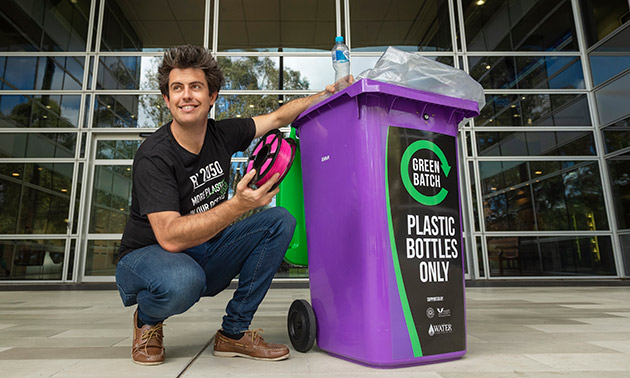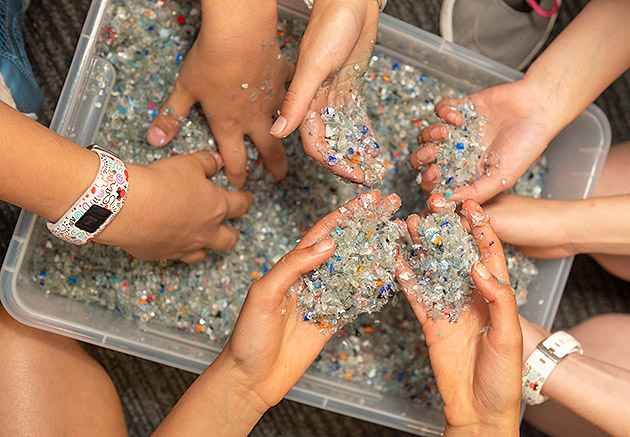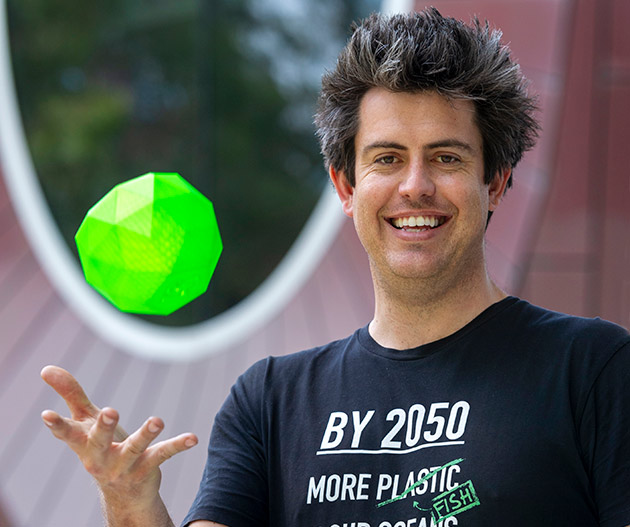5 November, 2018 By: Cristy Burne
When Darren Lomman discovered WA didn't have a plastic reprocessing facility, he did something about it. The result is Greenbatch, a crowd-funded social enterprise recycling WA's plastic waste.
By 2050, the predications are that there will be more plastic than fish in our oceans.
“When I first heard this, I didn’t believe it,” says Darren Lomman, a WA dad and engineer.
“I was on my couch, about 11 o’clock at night. I had Facebook on my phone and TV on in the background. Then this advert came on TV, promoting reusable shopping bags.”
So Lomman Googled the 2050 stat to find to his horror that its a globally accepted statistic, presented at the 2016 World Economic Forum.
“My daughter is going to be my age in 2050,” he says. “That really brought it home. Kids trust adults to look after these things, and I’m one of those adults.”
“WA is actually the second-highest generator of waste in Australia, and Australia is in the top percentile of waste-generating countries in the world,” Lomman says. “We’ve got some serious work to do.”
Keeping it local
Lomman decided to research and investigate the possibilities of local plastic recycling, which he found did not exist in WA.
“In WA we just put it on ships and send it away.” He says most of the plastic from our recycling bins is sold to overseas markets where 98 per cent of it is burned for fuel which in turn creates further pollution.
“PET plastic is one of the most recycled plastics around the world. It’s not ground-breaking or new territory to do it. But even globally less than 10 per cent of plastic is reprocessed," Lomman says.
“We should be taking responsibility for our waste, not passing it on to another country.”

So in October 2017, Lomman began to turn his local recycling vision into a reality. He started a crowd-funding campaign, raising $70,000 in just four weeks, and also received in-kind help from the University of Western Australia (UWA) and local businesses.
Lomman was ecstatic. “It’s a bit of a sign of the times,” he says. “The public actually care about waste and want to deal with it and take responsibility.”
Enjoying this article?
Sign up to our monthly enews
Turning the tide
Greenbatch is based on the simple philosophy of reusing rather than throwing it away or burning it. “Rather than collecting plastic and shipping it away, we’re recovering it, reprocessing it, and turning it into new products,” Lomman says.
The first product off Greenbatch’s plastic recycling production line is 3D printer filament made from plastic bottles that Greenbatch collects from participating schools. Once processed into printer filament he then returns it to the schools.

“Around 70 per cent of our high schools have 3D printers and they have been buying filament made out of virgin material,” he says. “So rather than that, we collect plastic bottles, turn it into filament, and give it back to the school for free, so the kids can make stuff on their 3D printers out of recycled bottles.”
Other products Greenbatch has produced so far from plastic waste includes pot plants, vases and cookie cutters. In the future that list could include light posts, material to build roads, even car bodies.
The non-profit started out with just one small shredder, however Lonman has had to order a larger machine to keep up with the volume of recycled bottles just coming from schools. The Greenbatch team are soon moving into a building at UWA, giving them the space to add more recycling machinery and take operations to the next stage.
The limiting factor, Lomman says, is not how much waste plastic can go in, but the volume of recycled plastic products the public is prepared to buy.
“I can make as much filament as Australia requires out of recycled plastic. But, I can only make as much as people are going to buy. It’s the same for all recycling industries.”

Small steps towards big change
The key to getting Greenbatch off the ground, says Lomman, has been progressing his vision in manageable stages.
“I don’t know all the answers to all the problems of dealing with the world’s plastic crisis. But I know I can run a crowdfunding campaign, I can talk to UWA and businesses, there are all these little steps I can take.
“The secret is taking action,” Lomman says. “You can’t wait for all the traffic lights to be green before you leave for work. Sometimes you just have to get in your car, turn on the ignition and go.”
If he ever needs more motivation, Lomman thinks of his daughter.
“It’s a travesty to be handing her a planet where there’s more plastic in the ocean than fish. I can’t walk away from this, for the sake of my daughter and all of her friends, and all their kids and grandkids.
“We all generate waste, we’re all responsible. There’s a lot of people who care about this. Let’s work on it together.”

What can you do?
Reduce your waste: “As consumers, we can influence through our purchasing,” says Lomman. “If something is wrapped in too much packaging, leave it behind and choose something that’s not.”
Buy recycled: “You are supporting the recycling industry by buying recycled products. If we want to have a healthy environment, we’ve got to support those industries that do reprocessing.”
Become a Greenbatch school: Join the 50 pilot schools across WA recycling plastic for their 3D printers.
Join Greenbatch on Facebook.
